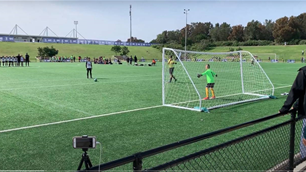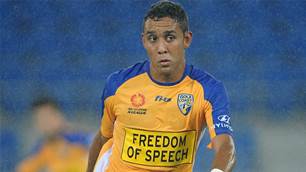EXCLUSIVE: A-League coaches Ange Postecoglou and Graham Arnold are examples of FFA’s philosophical revolution of improving coaching standards, says national technical director Han Berger.
To see Foster and Berger in action...
Speaking at a lively debate organised by the local Dutch community at Star City Casino last night, Berger recalled how he was stunned by coaching standards when he first arrived in Australia two years ago.
He joked that the only licence A-League coaches needed back then was a driver’s licence.
“You could literally coach an A-League club with your driver’s licence. In Europe you can forget about coaching a professional club in the top leagues without a pro licence. That’s the highest licence you can get,” he told the audience.
“Now for the first time ever we’ve organised a pro licence course and it’s an ongoing process," said Berger.
"There were two Australian coaches that took this course – and do you have any idea who this could be? Ange Postecoglou and Graham Arnold.
"And maybe it’s not a coincidence that if you look at their teams and the way they play that they stand out and their teams stand out.”
In Postecoglou’s case, Brisbane Roar have taken football to a new level, say most pundits, and sit clearly atop the A-League as we reach a halfway point.
For Arnold’s Mariners, they’ve played smart, effective football with a good deal of flair and are a finals certainty come next February.
And going beyond that, the success of the Young Socceroos at the recent U/19 AFC finals – where they reached the final under Dutch mentor Jan Versleijen playing a style of football that caught the eye too – showed that our next generation of players are beginning to benefit.
Berger said the program of coach education spoke of a broader view being implemented throughout the game at grassroots and elite level by his team at the FFA.
“The process of changing the whole philosophy and approach and the way you think about football at community level that’s a long term process – that can only happen by educating the coaches.
“It takes a couple of generations of coaches taking these courses because it’s philosophically 100% different to what it was two years ago,” he said.
“You have to invest – and that’s because I’m a football technician – in the quality of football. That in the end of the day will decide if football is viable in Australia or not.
“So for me, the spearheads are coach education and youth development that I’m focusing on.”
Craig Foster, also on the panel along with Sydney FC CEO Edwin Lugt, described previous coaching badges as a “complete waste of money” but noted that things are changing for the better.
“There was significant resistance,” he said when coaching standards were challenged in recent years.
“Now it’s the first time a group of former players are taking courses and are saying they are worth the money and they learnt.
"That battle’s been won and the effects now for the two coaches mentioned [Arnold and Postecoglou] is phenomenal – for them it’s phenomenal."
Berger added: “Coach education is a main focus and I think there is a major improvement in quality in the A-League that has absolutely to do with the appointment of a number of coaches at those clubs.
“You need good coaches to develop better players. It’s as simple as that. That takes time but I’m convinced that process will be decisive for the success of football in Australia.”
On a different topic, Berger said he was still largely unconvinced by the A-League marquee player concept, which goes back to level of football, he argued.
“I’ve said it all along and I say it every week at FFA there is a big focus in Australia on all sorts of things that are very important – the commercial side, the media side – but for me in the end of the day it begins with the quality of football," he said.
“That whole system of marquee players, you bring in a name and it’s just about a name. Well you can’t sell that product in Holland because the fans know he’s over the hill and doesn’t deliver, they simply do not come anymore. And that will happen here also.”
And on a sombre note, Berger said he was pessimistic about the game’s future in this country if the December 2 FIFA vote on hosting the 2022 World Cup didn’t go to Australia.
He added: “My personal opinion is that it’ll be a major setback. I’m afraid it’ll have an impact [on the game’s future] and not the one we hope for.”
To see Foster and Berger in action...
Related Articles

Fresh talent flock to ambitious A-League outfit's pro pathway

Why A-League 20/21 is crucial for Olyroos’ medal hopes














